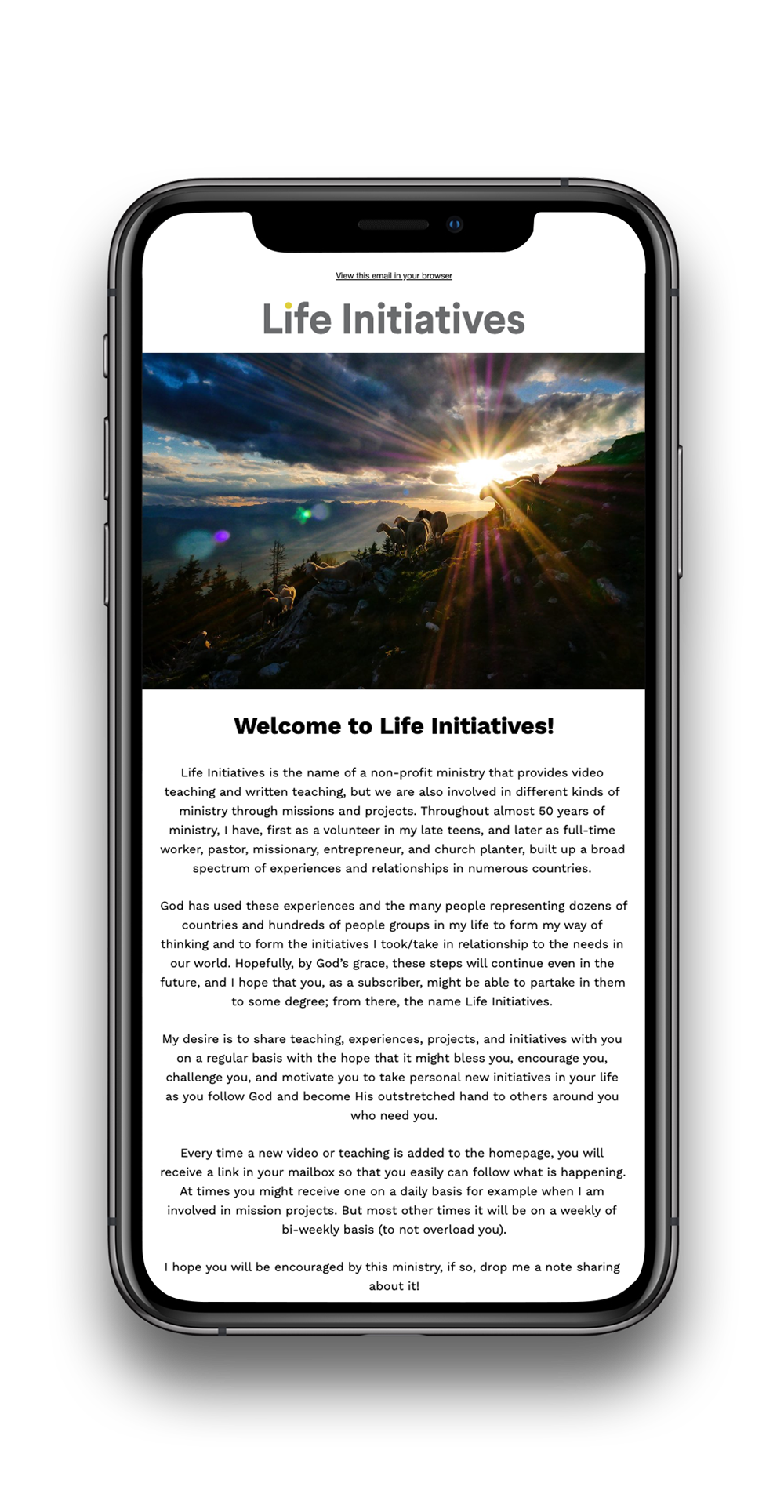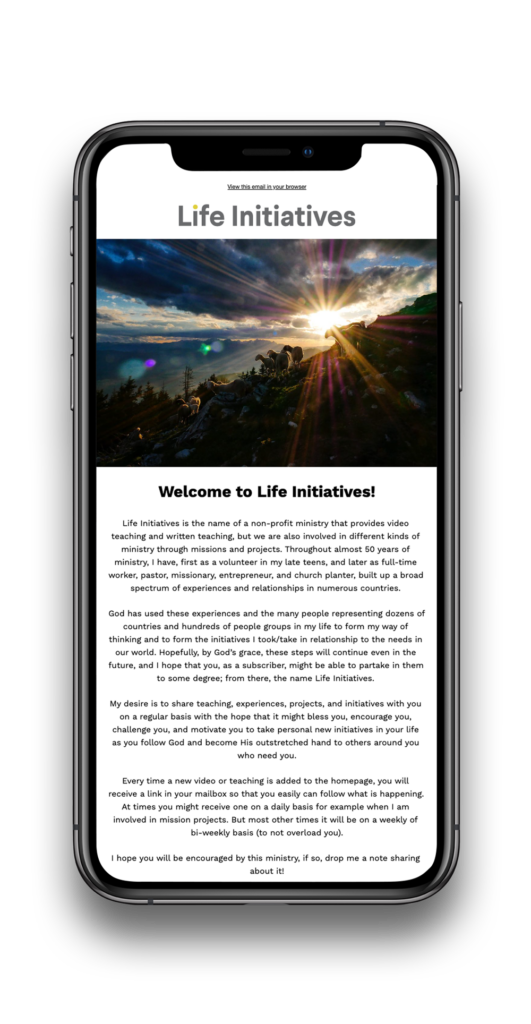Today I would like to finish my focus on the book of Jonah. Last time we went through the first two chapters of Jonah and we spend time addressing the fact that he disobeyed God and run off for Tarshish (Spain). Instead of going to the East (1200 km), he was on his way to the West (2000 + km). Why? Because the people in Tarshish would not remind him of his disobedience since they were not believers.
The central theme of that passage was:
We found that Jonah finally surrendered, and that God made the “huge sea monster” (as it can be translated) vomit him onto dry ground. That was the end of chapter 2.
3:1 Jonah got a second chance. The word of the Lord came to him a second time. When? We don’t know whether it was immediately when he stepped on dry ground or some time later. It is good to realize that not everyone in the Bible gets a second chance! We have stories of prophets who after disobeying God do not get a second chance. We can however, come back to God as long as we are sensitive to Him.
3:2 “Go to the great city of Nineveh”. This is the second time Nineveh is described as a great city. The emphasis was again on the immensity of the task. It was not going to be an easy job. The Bible never downplays the difficult aspects of the calling. It is a glorious call… a hard call at times… but with it comes adequate provision!

Jonah was not too happy about this message, but it sparked a tremendous revival! Why? Because the people were prepared. There was power in the message Jonah preached because God gave it to him!
3:3 Jonah obeyed the word of the Lord and went to Nineveh. Obedience is the key to effectiveness. It must have been much easier for Jonah to launch out into his task because of the miraculous delivery he had experienced. This is important to notice! So many people who have deep experiences with God forget so easily how faithful and true He has been. Each experience of God’s provision should become like a building stone for the next step we are to take. Instead of separate events! Use His blessings and presence that you have experienced to build a deeper and wider foundation for the next step you are to take! – It was a large city; three days were needed to cover the approx. 100 km around the “greater Nineveh area”.
3:4 He “proclaimed”. This must have been the most difficult part of his task. He did not fulfill his task by whispering a few words to a couple of people. We are told that he proclaimed, the word suggests “crying out” – bold proclamation. Once the start was made the big hurdle was overcome and the news spread like crazy around the city. The people had been prepared by God and they came in crowds to hear the word of the Lord. In Jonah’s story we find similarities with our own situation today. When we are to witness to strangers the hardest step is the first one. Getting started is the hardest thing. Your heartbeat is rising, and it might feel as if you can hardly open your mouth!
40 days in the Bible is often associated with judgment, testing or preparation. “Nineveh is going to be overturned!” Here is a stranger from an insignificant country and these are the mighty, arrogant Assyrians.
The response is surprising: verses 3-9 describe revival! When using the word revival nowadays we relate to restoration of life among those who have known God before. This is not the case with the people in Nineveh. Yet, we read “They believed God.” After that they declare a fast and all of them put sackcloth. Fasting in this case, is a sign of sorrow over sin. Sackcloth was worn by the poor, the prisoners or by slaves. By putting on the sackcloth they showed they were serious about the sin that they had committed, and they identified with their true position – being in need!
Even the king takes a radical stand and identifies himself with the sin. What a different kind of leadership of a Gentile king! He was truly a great leader. In our day and time many leaders do everything possible to cover up their tracks and few know how to humble themselves. They have a hard time admitting wrongs and often deny the charges. By a leader’s confession, God is honored!

3:10 God had compassion and did not bring upon them the destruction he had threatened. When the Ninevites repented… God repented. “Pretty amazing to read about the fruit of a reluctant missionary!” Jonah 4:1 ”But Jonah” One of those loaded words… “but”. It always introduces a change in direction. It indicates that something unexpected happened. There are often glorious “buts”, this is an inglorious one! He was greatly displeased and became angry! God has worked in miraculous ways, but Jonah the missionary gets angry!
4:2 He prayed to the Lord. It doesn’t seem like a prayer, more like a complaint. In the bible we often find that great servants of God complain directly to God. The Bible doesn’t glorify those complains… often the complainer is rebuked. Sometimes the rebuke is very gentle. If we doubt God’s ways, we better face up to that reality and go to Him to deal with it. Because when we go to Him whether in anger, disappointment or whatever, we give an opportunity to respond to our questions. (God did that when Moses complained about the burdens of leadership, to Jeremiah when he complained about his loneliness, to Asaph when he complained about the richness of the non-believers)
Now, to Jonah, when he is complaining about his theological problems! Let us realize that because God is supreme, that He is not intimidated with our questions or doubt! The fact is that when we dare to wrestle with God we often find deep and satisfying truths. Many times, I emerge out of those situations with a stronger conviction and a deeper passion!
4:2 This is what I said when I was still at home… Finally, we find the reason for Jonah’s disobedience. Why did he flee, why was he angry? He knew God was gracious and compassionate. Jonah was revolting against God extending his mercy to the gentiles! Jonah’s prayer was based on a common Jewish experience relating to his loving kindness… The Hebrew word is “hesed” which is used to describe God’s covenant love to Israel. It emphasizes God’s loyalty to Israel! The Jews considered the “Hesed” as exclusively for themselves. They did not want God to “hesed” others. When God told Jonah to go to Nineveh, he realized that God intended to show his hesed to the Gentiles. Jonah thought it should only be given to those who deserved it! Only the Jews deserved it in his opinion.
When God reaches out to the Ninevites, Jonah revolts. Theological racism that what is going on here! Actually, we find that this area might be one of the last areas that are being surrendered in the lives of most Christians! Why this response? Jonah had forgotten the importance of forgiveness and mercy! He had forgotten that he did not deserve mercy, nor salvation. It was so logical: Jews had it, others should not! (Think of the response of the elder brother in the parable of the prodigal son!)
4:3 Take my life, I want to die! (A pretty suicidal prophet we are meeting here, this is the second time he asks for it!) In Hebrew the words I, ME and MY appear 9 times in verses two and three. Jonah might have thought that he had the right theology… but he was self-centered! His selfishness colored his judgments and his attitudes: “I and my people are better than all others!”
Vs 4 – The story goes on and the attitude remains the same…God provided a vine to cover Jonah from the scorching sun and he became very happy (extremely happy). “I deserve God’s attention and His comfort!” He is on an emotional roller-coaster: terribly angry when God wants to save the Ninevites, extremely happy when he is looked after! When affirmed he responds with great joy. When others are affirmed: Not fair! (Like the older brother remember!)
Vs 8 East wind comes up, a dry, hot, desert wind called sirocco, lasts usually 3-7 days. The air is full of fine dust and blurs the sun and the dryness makes it wearisome. Normally people run for shelter, but the shelter was gone and the only shelter left was found in Nineveh. He wants to die again. He is totally defeated.
Then God questions Jonah again… Jonah snaps back at God. But God instead of rebuking him, starts to firmly reason with him. Vs 10!
God describes that Jonah had not invested in anything, not in the vine, not in the Ninevites… Yet God had!
God describes them as people in need. They cannot tell their right from their left. They don’t know where to go. They are not innocent, but they are ignorant. God is concerned for them. The word concerned carries “compassion” with it.
The emphasis is on the helplessness of the Ninevites. This has everything to do with the Gospel. We all are helpless, under the power of sin. We have no hope, no ability to save ourselves.
But God looked down on us and provided a way of salvation.
Have you been saved? Then you know God is compassionate. If He is compassionate, there is hope for everyone. And is there is hope for everyone, you and I have the responsibility to somehow be involved in proclaiming that to those who do not know. God is a missionary God, that’s why His people are missionary people. This is one of the greatest arguments for missions. We must flesh out God’s concern by our involvement!
Will you and I be carriers of God’s compassion to the lost?
Sign up for life-changing insights, directly to your inbox.

© 2023 All Rights Reserved, Life Initiatives

Sign up for life-changing insights, directly to your inbox.